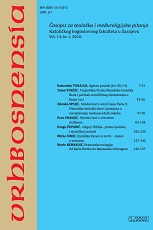Agûrov poučak (Izr 30,1-4)
AGȖR’S THEOREM
Author(s): Dubravko TuralijaSubject(s): Christian Theology and Religion
Published by: Katolički bogoslovni fakultet
Keywords: Agȗr’s theorem; earth; heaven; knowledge of saints; negation; primate; primitive man; sarcasm; self-denial; semantic; son; structure; water; wind; wisdom
Summary/Abstract: Agȗr (rWga’) - sage or alderman; teacher or father, is presented in the first verse of Prov 30. The verse does not have a regular poetic metric and the meaning is not clear, so that in searching the sensus plenior the text succumbed to different emendations and an alternative metathesis of syllables. A safe or at least a conventional meaning of this verse has not been discovered yet. Verses 2-4 - a public confession by Agȗr and a series of rhetorical questions – have tired many exegetes of the Proverbs. Plöger, on the one hand, considers these verses as an expression of an ironic person, unable to reach a predictable goal of human research and now under the influence of many errors. On the other hand, Toy proposes that someone from the Pharisaic community is trying to answer a fundamental question about the Sadducees and is searching for the absolute meaning of Massora, Law, and Prophets. Oesterley observes here a typical sarcastic person who is tempted to ridicule those who pretend to have universal knowledge. McKane opines that these verses reveal a pious Hebrew who is cultivating monotheistic religion opposed to the polytheistic manipulation of human knowledge. Lelièvre – Maillot take this biblical text as an example of a manifest of human intellectual limit and Scott sees unrealizable ironic person. Skeptical apology begins with E. J. Dillon (1895.) and has dominated over Agȗr’s wisdom for more than one century. Contemporary researchers discovered in it the orthodox expression which sometimes seems to take on a low dose of irony (Prov 30:4e) to obtain answers which had never been stated explicitly, but which are implicitly presupposed. Sarcasm, which Oesterley prefers, or irony, which Scott proclaims, is not clearly present in Agȗr’s theorem if we study his teaching in light of rhetoric and stylistic classical figures and if we look to Prov 30:1-4 as one body of Hebrew biblical poetry. In Prov 30:2-4, Agȗr’s public confession of piety is presented in two parallel and synchronic structural dimensions: Prov 30:2-3 and Prov 30:4.
Journal: Vrhbosnensia
- Issue Year: 2010
- Issue No: 1
- Page Range: 7-31
- Page Count: 25
- Language: Croatian

